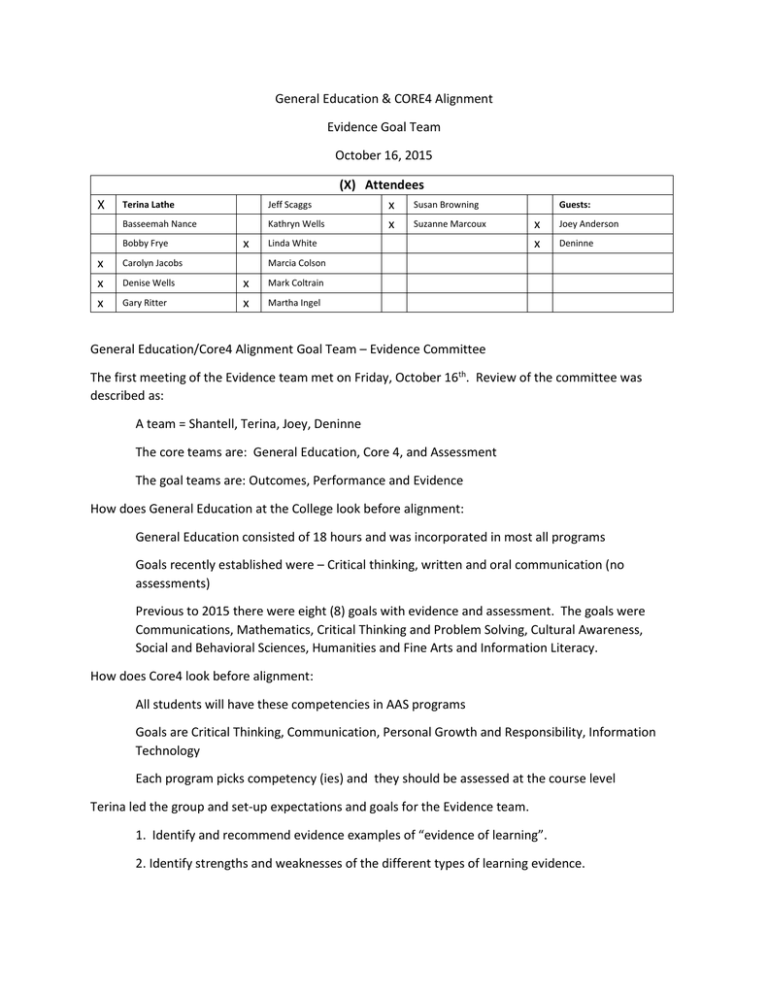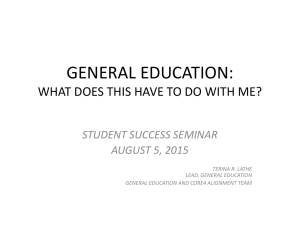General Education & CORE4 Alignment Evidence Goal Team October 16, 2015 X
advertisement

General Education & CORE4 Alignment Evidence Goal Team October 16, 2015 X Terina Lathe Jeff Scaggs Basseemah Nance Kathryn Wells Bobby Frye x x x x Carolyn Jacobs Denise Wells Gary Ritter (X) Attendees x Susan Browning x Suzanne Marcoux Linda White Guests: x x Joey Anderson Deninne Marcia Colson x x Mark Coltrain Martha Ingel General Education/Core4 Alignment Goal Team – Evidence Committee The first meeting of the Evidence team met on Friday, October 16th. Review of the committee was described as: A team = Shantell, Terina, Joey, Deninne The core teams are: General Education, Core 4, and Assessment The goal teams are: Outcomes, Performance and Evidence How does General Education at the College look before alignment: General Education consisted of 18 hours and was incorporated in most all programs Goals recently established were – Critical thinking, written and oral communication (no assessments) Previous to 2015 there were eight (8) goals with evidence and assessment. The goals were Communications, Mathematics, Critical Thinking and Problem Solving, Cultural Awareness, Social and Behavioral Sciences, Humanities and Fine Arts and Information Literacy. How does Core4 look before alignment: All students will have these competencies in AAS programs Goals are Critical Thinking, Communication, Personal Growth and Responsibility, Information Technology Each program picks competency (ies) and they should be assessed at the course level Terina led the group and set-up expectations and goals for the Evidence team. 1. Identify and recommend evidence examples of “evidence of learning”. 2. Identify strengths and weaknesses of the different types of learning evidence. 3. Establish protocol for collecting consistent evidence across general education and program courses 4. Suggestions for evidence based on all above 5. Model for faculty driven review and maintenance of evidence learning collection practices Members of the committee were grouped and asked to look at the following questions: 1. What does evidence of learning mean to you? Comments below: You can see growth in student Student can demonstrate progress Observable behaviors, product of goal Course completion Documentation Retention Self-reflection A vehicle for progress Student sense of accomplishment 2. What does evidence mean to students? Comments below: Grades Credits earned Time spent Ability to get a job Transcript/transfer of credits Feelings a sense of accomplishment/failure Useable feedback Criticism of one’s work 3. What does evidence mean to others? Comments below: To Employers – Grades Personalization self-interviews Transcripts Certifications/licensures/video transcripts Portfolios To Four year colleges Transfer process Degree completion Portfolios Service learning internships To Scholarship Committees GPA Exams Reference letter Projects Credits Standards – set-up by groups (accrediting agencies) 4. How might evidence look? What are the different types? Portfolios Receive something at end Videos Sketchbooks Juried work Credits/transcripts Badges??? Course completion Program completion Rubrics Signature assignments Capstone course Next meeting will be on Thursday, October 29th at 1:00.


